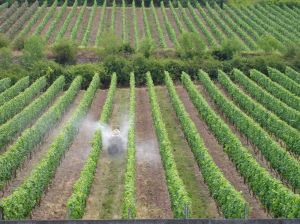Little information was available about the impurities because they were created during the production process so were not original ingredients.
"We estimate that the amount of these impurities is relatively high compared to other current dioxin sources, but this cannot be adequately quantified due to the commercial protection of data on pesticides use in Australia and internationally," Dr Gaus said.
She said pesticides with impurities used in high volumes represented a previously neglected but significant and concerning source of dioxins in the environment. They also posed a risk to the health of people handling pesticides, and to consumers.
"Some of these pesticides contained high concentrations of dioxins, comparable to those known from pesticides which are banned or restricted for use in most countries since the 1980s and 90s," she said.
Dioxins are linked to a range of cancers and are considered one of the most toxic man-made chemicals. They can cause adverse health effects in humans and wildlife including cancer, and act on development, reproduction and the endocrine system.
Research by Dr Gaus and PhD student Eva Holt last year showed that a wide range of currently used and globally marketed pesticides contained dioxin impurities, despite the widespread belief that modern pesticides were no longer a significant dioxin source.
As a result of their work, a new wave of suspensions, recalls, restrictions and government reviews on pesticide formulations is under way worldwide, including in the United States, Canada, New Zealand and Australia.
The study analysed 23 different pesticide formulations, containing 15 different active ingredients currently used in Australia (plus four formulations that are no longer registered for use in Australia), including insecticides, herbicides and fungicides. Dioxins were detected in all samples, including some commonly used products. Researchers estimate approximately 200 pesticides have the potential to contain dioxins.
The pesticides are used on crops including cotton, potatoes, lettuce, tomatoes, beans and peanuts, as well as in parks and recreation areas, at turf farms and plant nurseries.
"In view of the global manufacturing, distribution and use of pesticides, international regulation and monitoring strategies should be developed and implemented to identify, evaluate, and target pesticide dioxin sources at the manufacturing stage," Dr Gaus said.

